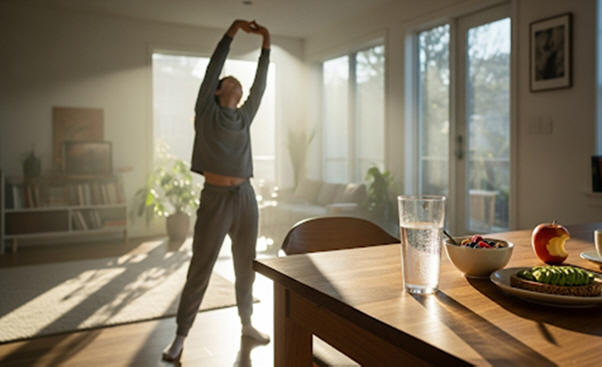When I wake up, my face is puffy? A daily routine to reduce swelling
|
Swelling is not just a beauty problem, it can lead to fatigue and poor condition of the body. Fortunately, it can be improved by changing small habits in life. If you adjust your eating habits, water intake, and movement, you can have a light day instead of a bumpy face and body. From now on, let's take a step-by-step look at the daily routine that reduces swelling.
1. a cup of hot water on an empty breakfast stomach
While sleeping, water in the body becomes insufficient and blood circulation slows down. At this time, drinking a glass of lukewarm water immediately after waking up promotes lymph circulation and facilitates the discharge of waste products in the body, helping ease swelling. Warm water gently stimulates the intestine, which has a positive effect on morning bowel activities, and a few drops of lemon can also increase metabolism. If you start your day with lemon water instead of coffee, it becomes a simple and effective habit to reduce swelling.
2. A short stretch or walk
In the morning, the body is stiff and the blood and lymph circulation are slow. Light stretching or a 10-minute walk can quickly relieve the swelling. Relaxing around the neck, shoulders, calves and ankles is effective for swelling of the face and lower body. Yoga's 'Down Dog Position' and the 'Leg-Up Motion' are especially good. If you don't have enough time, you can feel a big difference just by turning your neck and stretching your shoulders after counting.
3. a low-salt breakfast
Salty food is the main cause of swelling that causes water retention in the body. In particular, excessive salt intake the previous evening is a common cause of swelling of the morning face. In the morning, it is recommended to eat low-sodium foods, fresh fruits, and vegetables. Bananas are rich in potassium, helping to discharge sodium, while cucumbers and pumpkins promote water discharge. Onions relieve swelling through diuretic action. If you drank too much the day before, choose pollinated vegetables such as cucumbers and tomatoes instead of hangover soup.
4. Drink water often, little by little
Drinking a lot of water doesn't mean it's good. If you inhale a lot at once, the body tries to store unnecessary moisture. Therefore, the habit of drinking small amounts often is important. Aim to aim for 1.5 to 2 liters per day, and recommend water, barley tea, and lemon water instead of caffeine drinks. It is also a good idea to set an alarm with a water bottle on your office desk and drink it little by little. However, excessive water intake in the late evening can worsen morning swelling, so be careful.
5. light activities that help with circulation in the afternoon
In the afternoon, the legs and feet often feel heavy. This is because they sit or stand in the same position for a long time. In this case, it is effective to get up in the middle and walk lightly or rub your calves. Simple movements such as lifting your toes and turning your ankles while sitting on a chair also help reduce swelling. Small habits of climbing and descending stairs significantly reduce afternoon fatigue and swelling.
6. Dinner diet and lifestyle management
Managing your dinner is also essential to prevent swelling. Late-night snacks, fatty foods, and alcohol are all factors that worsen swelling. In the evening, it is recommended to eat a light protein-oriented diet and vegetables to help release moisture. In addition, if you take a light walk or take a lower body bath after dinner and sweat, it is effective for deep sleep and relief of swelling. The habit of sitting on your smartphone until late at night should be avoided as it interferes with blood circulation.
7. Pre-bed leg massage and water control
Lymph massage before going to sleep is effective in relieving swelling accumulated throughout the day. Massage like sweeping from the calf to the thigh promotes blood and lymph circulation. Sleeping on a pillow slightly higher or keeping your legs higher than your heart can also help reduce morning swelling. However, it is desirable to reduce intake from 1-2 hours before sleep because excessive water intake immediately before bed interferes with good sleep and causes morning swelling.
Swelling can occur in anyone, but it can be reduced sufficiently with constant care. Starting with a glass of water in the morning, stretching, a proper diet, water intake habits, afternoon activities, dinner management, and pre-bed massage will gradually lighten your body and improve your condition. Reducing swelling is not just a simple appearance management, but an important habit to keep one's health. Let's practice a small routine from today. Your face in the mirror will become lighter and you will feel the change in your daily life.
This article was translated by Naver AI translator.




